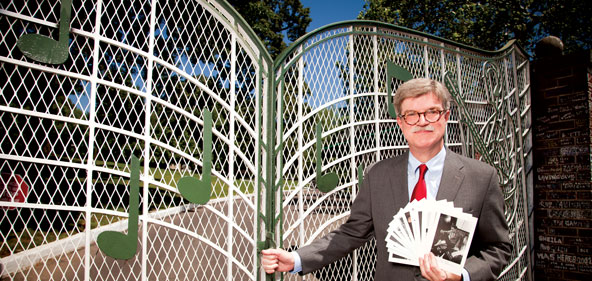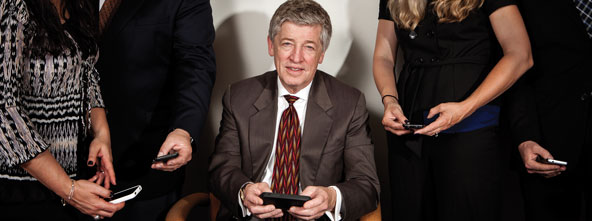50 simple ways you can market your practice

50 Simple Ways You Can Market Your Practice. Lettering by Kelly Hume.
You can spend a lot of money on legal marketing, but you don’t need to. Nor do you have to be naturally outgoing or charming. What is necessary for good business development, say successful lawyers and consultants who shared their strategies with the ABA Journal, is a marketing plan focused on activities you do well, targeted at the right audience and carried out consistently. Give it some time, they say, and business will come.
Being genuine—and helpful, even if your actions may not offer immediate business—doesn’t hurt either.
1.) Some lawyers believe that if you do good work, people will automatically come to you. They are wrong. People need reminders.
2.) Contact three to five potential referral sources a week—every week, regardless of how busy you are—and arrange to meet for coffee, drinks or a meal. That works much better than reaching out only when business is slow.
3.) At business receptions, ask organizers whether you can be a greeter. This gives you a great reason to introduce yourself to people.
4.) If you have a practice-related blog, write posts with information that’s truly useful to business targets. More often than not, that doesn’t include descriptions of how competent you or your firm are.
5.) Your firm’s holiday card is probably one of many that clients or potential clients receive. Find another holiday (or make one up) that you enjoy and that complements your practice. Separating yourself from other, similar messages is of real value.

Lucian Pera, at Graceland, sends clients and potential clients cards for Elvis’ birthday. “For a number of people I do business with, my connection to Memphis is important. I want them to think about Memphis and think about me, and I don’t want there to be more than a half second between those two thoughts.” Pera, who is also ABA treasurer, offers tip No. 5. Photo by Dero Sanford.
6.) Think hard about who your target market is, and where the decision-makers are in that market.
7.) When you meet a potential client, focus on his or her immediate needs. It may have nothing to do with your practice. Maybe that person’s immediate need is to find a dentist. If you know one and can connect them, there’s a better chance the person will think of you when services you offer are needed.
8.) Organize a monthly dinner group of law school classmates, varying the practice areas so attendees have greater referral opportunities.
9.) Develop a marketing plan around activities you enjoy. If you like to write, think about an electronic newsletter. If you connect better with people one on one, consider volunteer work with an activity that complements your practice.
10.) Focus on good lawyers who are your contemporaries when thinking about potential referral sources. More experienced lawyers already have people to whom they refer cases.

Tip No. 10—Steve Hurley: Focus on good lawyers who are your contemporaries when getting in touch with potential referral sources. More experienced lawyers already have people to whom they refer cases. Photo by Sara Stathas.
11.) Don’t adopt a false marketing persona. Be yourself, and figure out the best way to present yourself in a way you find appealing.
12.) You don’t need to hand a business card to everyone you meet at a reception if it feels forced and desperate. Instead, get other people’s cards, and email your contact information afterward. There’s a better chance they will remember you.
13.) Providing they label it attorney advertising, personal injury lawyers may send ad letters to accident victims. And arrest reports can offer good leads for criminal defense lawyers. Family law attorneys may send advertising letters to pro se defendants in divorce cases, determining who to contact based on parties’ ZIP codes.
14.) If you hope to be hired for an appeal, read all the briefs as well as related cases, and figure out the case’s arguments. Be prepared to speak with the party about the case—without notes—for one hour.
15.) Posting tweets between 1 p.m. and 3 p.m. Eastern time gets the highest click rate, according to Mashable. You can schedule tweets to be posted by services like HootSuite. But be careful if you have work during those scheduled times. You don’t want a client to think you are tweeting while you’re defending a deposition.

Tip No.15—Molly DiBianca: Posting tweets between 1 p.m. and 3 p.m. Eastern time gets the highest click rate, and you can schedule tweets to be posted for you by services like HootSuite. But be careful if you have work during scheduled times. You don’t want a client to think you’re tweeting while you’re defending a deposition. Photo by Michael Branscom.
16.) Criminal defense lawyers: If an attorney in a different practice area has been a great referral source and their kid gets into trouble, think about handling the case for free.
17.) People sometimes need to be convinced that their legal problem is severe enough to hire you, and it’s up to you to persuade them. That said, turning someone away when they really don’t need a lawyer is good for business, too. It’s a good way to build trust.
18.) Attend bar association events. Lawyers only refer cases to people they know; and if they don’t see you, they won’t think of you.
19.) Install Google Analytics on your website. It details what search terms got people to your site and how long they stayed there. You can also use it to determine popular search terms, and put the terms that relate to your practice on your website.
20.) Volunteer with various legal and community groups. Do the volunteer work to the best of your ability, even if you don’t like it.
21.) End a conversation with someone at a networking event after you finish a statement, rather than when they finish one, so they won’t think you’re cutting them off.
22.) If you want to represent a business with a legal department, your job is to make in-house counsel’s job easier.
23.) The best elevator speech? “Hi, I’m a lawyer. What do you do?”
24.) Speak at a continuing legal education seminar only when you think it’s an interesting one that will be well-attended.
25.) Don’t buy a table at an event. Instead, buy seats at different tables so you can spread out and meet more people.
26.) If you are out consistently, meeting with people and doing outreach, you can be successful. There may be days you don’t feel like doing it, but consistency is key.
27.) If you have a website (and you should), have a blog, too. Add new content daily, because Google algorithms give more prominence to sites with fresh, original content. The content doesn’t have to be in the form of a long, researched post. A paragraph or two, with a recent link to something interesting and relevant to your practice, will get you the same amount of traffic—if not more—than longer posts.
28.) Don’t limit networking to in-house counsel, especially at bar events. You never know who someone in private practice knows—or when they will go in-house.
29.) Take time once a week to write LinkedIn endorsements for people you’ve worked with and respect. Don’t wait for them to ask for one; do it on your own.
30.) A reputation as a stand-up person is the best marketing tool. It takes a whole lifetime to build up that reputation and only one negative incident to destroy it.
31.) Join bar associations that welcome you, not those that are closed clubs. 32.) Before meeting someone you’d like to have as a client, research their business on the federal case site Pacer to get a better sense of potential legal needs. Also, read quarterly reports, check out websites and do a Google News search to see what stories have been published about the business.

Tip No. 32—Emery Harlan: Before meeting someone you’d like to have as a client, research their business on the federal case site PACER to get a better sense of potential legal needs. Also read quarterly reports, check out websites and do a Google News search to see what stories have been published about the business. Photo by Sara Stathas.
33.) Never criticize a company by name in a blog post. You never know when that company might be in a position to hire you.
34.) Market the work you’d like to be doing, not the work you have to do to pay the bills.
35.) Have an office that’s convenient to reach. Being near the courthouse may not be the best place because there’s rarely free parking.
36.) Read your city’s business publications to get a better sense of legal needs that are not being met, as well as future areas for which people will need counsel.
37.) Go to events to give, rather than to get.
38.) If your community offers free classes, think about volunteering to teach one in an area that complements your practice.
39.) Join groups that have few lawyer members.
40.) Handing out items with your business logo at a trade show? Make sure they’re easy to pack and meet TSA carry-on standards.

Tip No. 2—Janice Brown: Contact three to five potential referral sources a week—every week, regardless of how busy you are—and arrange to meet for coffee, drinks or a meal. That works much better than only reaching out when business is slow. Photo by Nick Nacca.
41.) If you represent consumers, think about a storefront office. People with legal needs probably are not riding up and down office building elevators, unless they already have an attorney.
42.) Ask for a guest list before you attend a business event, and identify individuals you’d like to meet.
43.) Do adjunct professor work. It adds to your expertise, and former students can be great referral sources.
44.) A few good questions to ask people you meet in networking situations: What got you started in this line of work? What are you working on? How are things going with your business in this economy?
45.) Ask the staff of the association that hosts an event to introduce you to people who you think you should know at bar or trade association events.
46.) If you send other lawyers potential clients, let them know. They’ll appreciate that you referred the clients, and it will help them to remember that you did so. If they don’t remember, you need to move on to lawyers who will.
47.) Talking to reporters can be a good thing. To gain their respect, you’ve got to show them you have genuine expertise in a subject and can give pithy answers to their questions.
48.) Multiple people can go with you to a beauty contest, but only one person should do the talking. Clients hire lawyers rather than firms.
49.) Give people you meet a brief description of what you do, rather than stating your title.
50.) Don’t brag about yourself because people won’t take you seriously. No one hires lawyers they don’t take seriously.



